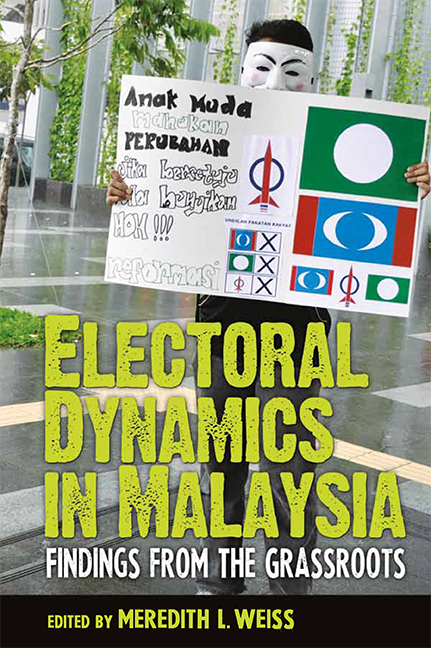Book contents
- Frontmatter
- Contents
- List of Tables
- Foreword
- Acknowledgements
- Glossary & Acronyms
- Chapter 1 Introduction: Patterns and Puzzles in Malaysian Electoral Dynamics
- Chapter 2 Arau, Perlis: The Irresistible Charm of Warlords, Women and Rewards?
- Chapter 3 Padang Serai, Kedah: Between the ‘Personal Touch’ and the Generous Hand
- Chapter 4 Kuala Nerus, Terengganu: New Malay Politics?
- Chapter 5 Balik Pulau, Penang: Home Run for the Home Boys
- Chapter 6 Lumut, Perak: Patronage, Clientelism and the Post-Coup Order
- Chapter 7 Kuantan, Pahang: Revealing the Ordinary
- Chapter 8 Pandan, Selangor: New Electoral Dynamics in Urban Malaysia
- Chapter 9 Kepong and Titiwangsa, Kuala Lumpur: Messages or Money?
- Chapter 10 Rembau, Negeri Sembilan: Personalities and Promises
- Chapter 11 Pulai, Johor: A Tale of Two Coalitions
- Chapter 12 Gelang Patah, Johor: Did Lim Kit Siang Truly Win His Last Gamble?
- Chapter 13 Kota Marudu and Keningau, Sabah: Personality, Patronage and Parochial Politics
- Chapter 14 Tuaran, Sabah: Party Loyalty and Rational Voting
- Chapter 15 Kota Kinabalu, Sabah: BN Loses Its ‘Fixed Deposit’
- Chapter 16 Beaufort, Sabah: Whither Lajim's Popularity?
- Chapter 17 Sibu and Lanang, Sarawak: Defeat of the Bosses
- Contributors
Chapter 13 - Kota Marudu and Keningau, Sabah: Personality, Patronage and Parochial Politics
Published online by Cambridge University Press: 10 November 2017
- Frontmatter
- Contents
- List of Tables
- Foreword
- Acknowledgements
- Glossary & Acronyms
- Chapter 1 Introduction: Patterns and Puzzles in Malaysian Electoral Dynamics
- Chapter 2 Arau, Perlis: The Irresistible Charm of Warlords, Women and Rewards?
- Chapter 3 Padang Serai, Kedah: Between the ‘Personal Touch’ and the Generous Hand
- Chapter 4 Kuala Nerus, Terengganu: New Malay Politics?
- Chapter 5 Balik Pulau, Penang: Home Run for the Home Boys
- Chapter 6 Lumut, Perak: Patronage, Clientelism and the Post-Coup Order
- Chapter 7 Kuantan, Pahang: Revealing the Ordinary
- Chapter 8 Pandan, Selangor: New Electoral Dynamics in Urban Malaysia
- Chapter 9 Kepong and Titiwangsa, Kuala Lumpur: Messages or Money?
- Chapter 10 Rembau, Negeri Sembilan: Personalities and Promises
- Chapter 11 Pulai, Johor: A Tale of Two Coalitions
- Chapter 12 Gelang Patah, Johor: Did Lim Kit Siang Truly Win His Last Gamble?
- Chapter 13 Kota Marudu and Keningau, Sabah: Personality, Patronage and Parochial Politics
- Chapter 14 Tuaran, Sabah: Party Loyalty and Rational Voting
- Chapter 15 Kota Kinabalu, Sabah: BN Loses Its ‘Fixed Deposit’
- Chapter 16 Beaufort, Sabah: Whither Lajim's Popularity?
- Chapter 17 Sibu and Lanang, Sarawak: Defeat of the Bosses
- Contributors
Summary
Introduction
The 2013 Malaysian general election was widely considered a litmus test for Najib Razak and his government's various ‘transformation’ programmes. While the Barisan Nasional (National Front or BN) faced a tough challenge in Peninsular Malaysia, in Sabah and Sarawak the coalition remained strong. Of the twenty-five federal seats contested in Sabah in 2013, two were regarded as ‘hot’ seats – Kota Marudu and Keningau (see Hazlan and Koh 2013). In Kota Marudu, incumbent Maximus Ongkili of BN faced a strong challenge from Maijol Mahap of Parti Keadilan Rakyat (People's Justice Party or PKR). Growing sentiment against BN and Maijol's popularity gave PKR the upper hand to wrest Kota Marudu from BN. In Keningau, the embattled Huguan Siou (paramount or brave leader) of the Kadazandusun community and president of Parti Bersatu Sabah (Sabah United Party or PBS), Joseph Pairin Kitingan, was defending the seat from his brother, Jeffrey Kitingan of the State Reform Party (STAR). Jeffrey was bullish on his chances of success.
Winning in Kota Marudu was important for Maximus as it would increase his chances of replacing Pairin as president of PBS. However, although deputy president and thus a natural choice, Maximus was struggling to consolidate his support in the party. Both Maximus and Pairin were held at ransom by those who wanted to see an end to PBS's influence in Sabah politics. In particular, STAR hoped to make inroads. Jeffrey's decision to contest in Bingkor and Keningau was two-fold: Jeffrey was confident of winning Bingkor and hence gaining the opportunity to play an active role in Sabah politics once more, and a victory in Keningau would end Pairin's political career and make STAR the champion of states' rights in Sabah.
Three main issues shaped the electoral outcomes in Kota Marudu and Keningau. The first was the role of personality in electoral politics, especially the excessive adulation of political leaders such as Keningau's Jeffrey and Pairin, both highly respected and regarded as ‘irreplaceable’ folk heroes.
- Type
- Chapter
- Information
- Electoral Dynamics in MalaysiaFindings from the Grassroots, pp. 181 - 196Publisher: ISEAS–Yusof Ishak InstitutePrint publication year: 2013

